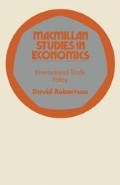Abstract
Most theoretical analysis of trade policy is undertaken in terms of tariffs — that is, duties levied on imports. There are a number of good reasons for this. First, tariffs are the single device employed most widely for regulating trade flows. Second, except under special circumstances, tariffs are the only measure of trade regulation permitted by GATT. Third, they operate through the price mechanism which represents the heart of modern economic theory. In consequence, tariff analysis can be readily adapted to encompass other trade controls which operate through the price mechanism; for example, export duties and subsidies, import subsidies and quotas and several other types of non-tariff barrier.
Preview
Unable to display preview. Download preview PDF.
Author information
Authors and Affiliations
Copyright information
© 1972 David Robertson
About this chapter
Cite this chapter
Robertson, D. (1972). Theory of Tariffs. In: International Trade Policy. Macmillan Studies in Economics. Palgrave, London. https://doi.org/10.1007/978-1-349-01432-3_2
Download citation
DOI: https://doi.org/10.1007/978-1-349-01432-3_2
Publisher Name: Palgrave, London
Print ISBN: 978-0-333-13371-2
Online ISBN: 978-1-349-01432-3
eBook Packages: Palgrave Business & Management CollectionBusiness and Management (R0)

